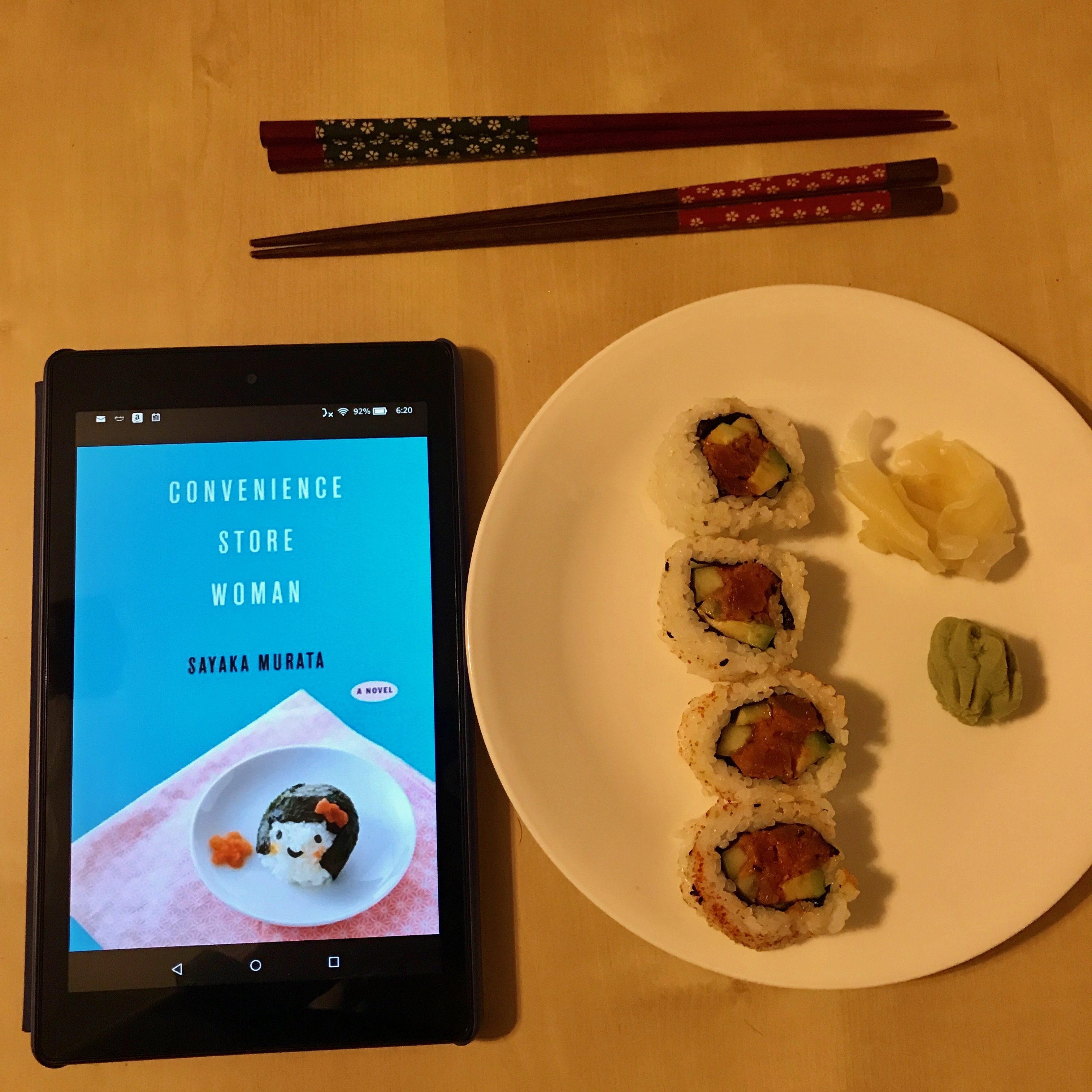I received a digital ARC of this book from Grove Press on NetGalley. I’m grateful to Grove Press for their generosity and am happy to post this honest review. All opinions are my own.

You eliminate the parts of your life that others find strange—maybe that’s what everyone means when they say they want to “cure” me. These past two weeks I’d been asked fourteen times why I wasn’t married. And twelve times why I was still working part-time. So for now I’d decide what to eliminate from my life according to what I was asked about most often I thought. Deep down I wanted some kind of change. Any change, whether good or bad, would be better than the state of impasse I was in now.
Synopsis
Keiko Furukura has been working at the same convenience store since she was eighteen. While this was fine when she was just starting out, she’s thirty-six now, unmarried and childless. Keiko is content among the contents in the aisles of her store; however, her family and friends are worried, and their worry is starting to upset the careful order of Keiko’s days. To assuage everyone’s worries and restore her own equilibrium, Keiko resolves to make the changes that will lesson their scrutiny and return her to her quiet life—except that along the way, Keiko discovers that the life she wants and the life others want for her may not be reconcilable.
Setting
As you can guess from the title, much of the action takes place in a Tokyo convenience store where Keiko has spent over half her life as a part-time employee. Though translated, the book is easy to read; the only nuance necessary for an American audience to really appreciate the story is to understand the place of convenience stores in Japanese culture. A Japanese convenience store is not simply a 7/11 offering old hot dogs and questionable coffee. Japanese konbini are safe, brightly-lit, spaces that also sell fresh food you would actually want to eat. Japanese culture in general highly values excellent customer service; accordingly, konbini employee behavior is pretty tightly prescribed. This blog includes pictures of a poster instructing konbini employees on how to appear and interact with customers. This one has an excellent summary on things that set konbini apart from their American cousins.
Character Study
With that introduction, Convenience Store Woman is a character study of Keiko set largely within the walls of her konbini. The early parts of the book have flashes of Keiko’s early life—where she finds a dead bird on the playground surrounded by mourning children and responds by taking it to her mother because her father enjoys eating birds (presumably a different kind of bird but I’m not actually sure)—Keiko believes she is contributing something good while her tiny compatriots and their parents find her to be a monster for not mourning the tiny death in the park. Similarly, Keiko ends a fight in first grade by hitting a boy over the head with a shovel—everyone was yelling to stop the fight and this was the most expedient way to do so.
Having learned that her instincts and interpretation of social cues are apparently wired differently from those around her, Keiko turned inward. She is an expert observer and mimic, designing the details of her life—her clothing, her speech patterns, her topics of conversation—around those she sees and hears from her fellow coworkers. Keiko’s life is ordered and neat, she knows what to do and what to expect at any given point in her day-to-day life. Her only moments of discomfort occur when others around her question why she is still working at the konbini and why she has never had a boyfriend.
Though it is not stated anywhere in the book or in any interviews with the author, Keiko’s presentation strongly reminded me of someone on the autism spectrum. She thrives on order and being given clear expectations and instructions for her speech and behavior. She is extremely rational—the moment with the shovel as a child is less an example of how Keiko might be prone to violence (she’s not) and more an example of how she isn’t bound by social convention in coming to the most expedient resolution to the problem everyone identified.
Ultimately, whether she is or isn’t on the spectrum, isn’t the point here—Keiko is who she is, labels or no. Keiko’s different wiring is what makes Convenience Store Woman such a fascinating character study. She is not someone who resists convention for the sake of being different—indeed, she can embrace conventions in speech and dress when to do so makes sense in her life and abhors standing out. That this is decidedly not Keiko is highlighted by the appearance of another character, Shiraha—a character who drove me so nuts I almost stopped reading.
Turns Out Entitled Men Are Everywhere
Shiraha is entitled—simultaneously trying every way to not work while complaining about how we’re all going back to the stone-age and he’s so put upon. We should apparently pay him just to grace us with his presence and bad mood. He resists doing what he’s told and fitting in seemingly for the sake of resisting. He is everything bad in the stereotypical white man, except he’s Japanese in Japan. I suppose it means they’re everywhere.
But seriously, his character speaks in sweeping, offensive paragraphs that nearly turned me off the book. I can see his use as a foil to Keiko and appreciate that a male was used to further a female’s character development but this “depressing Paleolithic nightmare man” is far less charming and fun to read than your usual manic pixie dream girl. His character was designed to be this over the top; I just have an internal limit of misogyny I can read, even when it serves a purpose in a work of fiction. Murata hit it with Shiraha.
Structure
While Convenience Store Woman is narrative fiction, very little actually happens (and nothing dramatic). Instead the interactions and events serve to introduce another layer of Keiko to the reader and, in some ways, Keiko to herself. In trying to change her life, Keiko comes to appreciate what it is she can and can’t live with for the sake of others.
This narrative structure has the effect of making Convenience Store Woman a slower read. The mercy here is that the book is remarkably short—it’s 176 pages and I moved through it fast enough on my kindle that the progress bar made me double-check to make sure I’d received a full book and not a sample. This length is just right for the book—because so little happens, much longer would have felt like the book dragged. Instead, I felt like I got to know Keiko just the right amount for both of us and then was able to close the book and move on.
Notes
Published: June 12, 2018 by Grove Press (@groveatlantic)
Author: Sayaka Murata (Ginny Tapley Takemori, Translator)
Date read: June 10, 2018
Rating: 3 ½ stars

